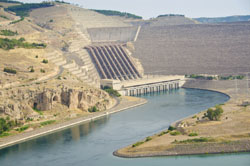Climate change and conflicts over water
The 'Climate change, hydro-conflicts and human security' (CLICO) project studied whether the impacts of climate change on water resources intensified social tensions and conflicts or provided opportunities for peaceful cooperation in the area of the Mediterranean, Middle East and Sahel. Researchers also investigated the reasons why some countries and communities were more vulnerable than others, and what sort of policies and institutions at the national and international levels are required to ensure adaptation, peace and security. Project partners examined 11 case studies and collated the first dataset of its kind on water-based conflicts, which was compared against climatic, hydrological and socioeconomic variables. Results showed that adaptation plays a key role in whether climate change is likely to undermine human security. Although state-led adaptation was important for providing security, there can be negative consequences if policies do not reflect the needs of affected people and are not properly implemented. Adaptation can either strengthen or widen inequalities between different social groups, depending upon power relations, governance and institutional structures, and existing marginalisation of certain sections of society. Consortium members identified stronger links between political, economic and social factors and water-related conflicts than between climate-related variables and water conflicts. However, these relationships could change in the future and, at present, methods for addressing future environmental, climatic, socioeconomic and political uncertainties need improving. Furthermore, policies explicitly aimed at reducing conflicts are lacking. CLICO made a number of recommendations to policymakers that included increasing knowledge, strengthening accountability and institutions, better policy implementation, and improving communication and cooperation between actors. In addition, climate change adaptation and risk reduction should be mainstreamed, social security systems and civil protection strengthened, and early warning systems used to highlight systemic issues. Project results can be used to identify potential hotspots in the Mediterranean, Middle East and Sahel and to provide fresh policy ideas for promoting peace and security in the face of a changing climate and dwindling water resources.







